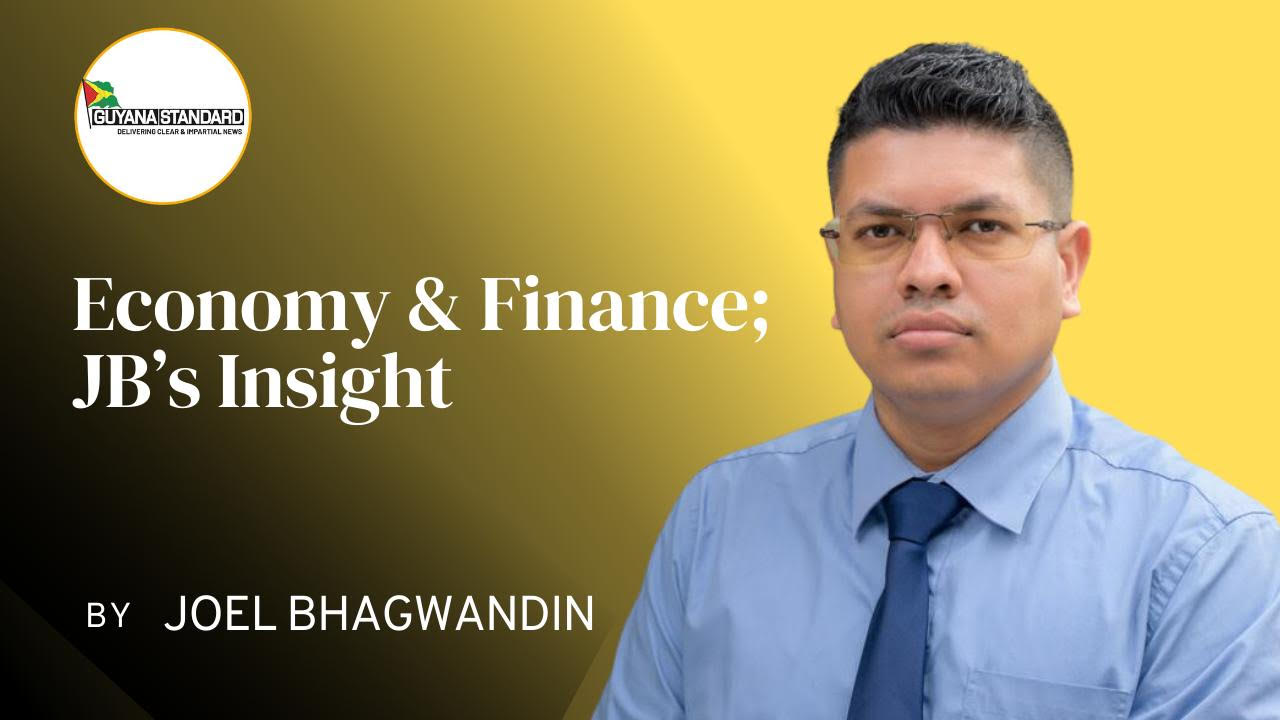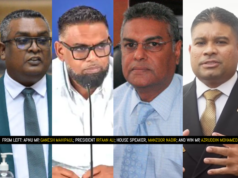Summary
Professor Hunte expended a lot of his time over the years defending his track record as the last [former] General Manager of GAIBANK in response to several writers who accused him of mismanagement and the ultimate failure of the entity. Yet, until now, no one has ever challenged the Professor with compelling evidence―as illustrated herein by this author.
Based on the findings and analysis presented, it can now be safely concluded that the Professor was largely responsible for the demise of GAIBANK.
Noteworthily, his tenure was characterized by a profound lack of transparency and accountability, poor lending decisions, understating the true state of the bad and doubtful loans relative to the total loan portfolio, and in so doing, effectively reported fictitious surpluses for some years. As such, he has no credibility and authority to speak on accountability and transparency on oil and gas matters. Further, his analyses and arguments are often times flawed and mediocre.
1. Background
Reference is made to a letter that was published in the Kaieteur News edition of April 28, 2023, by former General Manager of the Guyana Co-operative Agricultural and Industrial Development Bank (GAIBANK), Professor Dr. Kenrick Hunte. The Professor sought to address ExxonMobil’s first quarter oil report wherein he contended that the information released by the Bank of Guyana (BOG) “is no better than a publicity stunt that obviates any standard associated with complete transparency.”
The Professor further asserts that “we have not learnt anything from our history. In particular, it appears that we have replaced the Sugar Barons with Oil Barons…Is history repeating itself as more oil is found?”
In response to the aforementioned arguably unjustified postulations by the Professor―and since he argued whether history is repeating itself, this author sought to examine the Professor’s own track record at a time in our history where he presided as the General Manager of GAIBANK.
Of note, the Professor’s track record regarding transparency is also examined in terms of management of the entity and reporting. The evidence will show herein that it is ironic that the Professor’s own track record in this respect leaves much to be desired, because there was a lack of transparency and accountability of the failed institution, and mismanagement, inter alia, poor lending decisions.
2. Discussion and Analysis
In one of his letters a few years ago, Professor Hunte had disclosed that he was employed at GAIBANK from 1980-1993 in various technical positions before advancing to the General Manager in 1985–1993. The economist was responding to someone at the time who accused him of mismanagement of the said institution under his tenure which largely led to it having to be liquidated.
He then sought to deny this allegation and absolve himself of any mismanagement of the institution and claimed that if the government had implemented the Auditor General’s (AG) recommendation at the time in relation to foreign exchange losses that he claimed was a government liability, then the true profit of the entity would have been reflected.
In this regard, he cited the AG’s recommendation which stated that it was proposed by the AG to invoke the laws of Guyana to deal with the foreign exchange losses, section 50 (2) of the Co-operative Financial Institutions Act, Chapter 75:01. He claimed how the PPP government ignored the advice of the AG. However, a perusal of the referenced section of the Act states that:
“If the reserve fund is in any given year insufficient to cover any net loss of the financial institution recorded in its Profit and Loss Account, an amount equivalent to the deficiency is hereby charged on the Consolidated Fund”.
It would appear, nonetheless, that the former General Manager of GAIBANK was not entirely truthful in his missive. Because a perusal of the 2001 Bank of Guyana Annual Report, Table 5-V contained a statement of asset and liabilities of GAIBANK.
In contradiction to his claims, the table showed that as of June 1991 the accumulated deficit of GAIBANK was $397.6 million which was cleared resulting in a surplus position of $23.5 million by December 1991 and remained in a surplus position of $2 billion as of May 1995. There is another column in the table that showed government contributions on the liability side of the statement which could only mean that the deficit balance was cleared by way of a charge on the Consolidated Fund.
Importantly, it should be mentioned that when the Professor argued that the foreign exchange loss is a government liability, the implied interpretation by a non-technical person is such that, one may tend to believe that the liability is unrelated to the operations of GAIBANK. And therefore, it should not have been reported on GAIBANK’s balance sheet.
However, this is not the case. Indeed, the government was the sole shareholder of the entity, but the foreign exchange gains or losses are directly related to the normal operations of the bank. Hence, it is correctly reflected on the entity’s balance sheet.
The core business of the development bank was lending and therefore, the true performance of the institution under Hunte’s tenure would have been reflected in the quality of the loan portfolio and not the foreign exchange gains/losses. In this respect, it must be highlighted that in the former General Manager’s letter of December 2009, he was careful to stay completely away from speaking to the portfolio’s performance under his tenure.
With that in mind, this author has managed to secure copies of the annual reports for GAIBANK for the period 1983-1987. Having examined these reports, there were some interesting findings worth mentioning.
To this end, in the 1983 Annual Report, the former General Manager, Kenrick Hunte, reported that “the bank performed creditably, recording the highest values ever in the levels of disbursement amounting to $29.4m, and repayments $21.7m, as well as 5275 processed and 3821 approved applications valued at $38m.
At the end of 1983, total assets stood at $90.3m, outstanding loan portfolio of $70.5m, and government equity contributions valued at $55m.”
Interestingly, what he did not report on was what portion of the loan portfolio was considered bad debt to be written off and/or contaminated.
The findings of the AG as reported in GAIBANK’s 1983 Annual Report were stated as follows:
❖ Interest on loans – $8,126,966: This figure may be affected as a result of the observation at paragraph 11 below.
❖ Investment income – $216,753: This amount is understated by $166,939 representing interest not brought into account in respect of fixed deposits totaling $2,886,872.
❖ Rent – $155,884: This figure does not agree with the amount $329,764 shown in the rent receivable register.
❖ Chain Saw Income – $489,990: This amount is overstated by an undetermined amount as it includes the cost of the chainsaw sold.
❖ Interest and credit fees – $1,571,527: This amount is understated by an undetermined amount due as interest for 1983 which was not raised in the accounts in respect of an International Development Association Loan.
❖ Gain (Loss) foreign exchange transactions – $1,269,279: This figure is overstated by $112,465 on sterling disbursements.
❖ Deficit at the end of the year – $5,405,483: This figure would be affected in view of the above-mentioned.
❖ Interest receivable – $10,402,288: The total of the balances on the customers’ loan accounts exceeds the balance of $10,402,288 by $464,773.
❖ Investment – $7,250,042: The balance is more than the balance confirmed by the Guyana National Co-operative Bank by $275,001.
❖ Stock – $750,063: This figure has not been verified as schedules supporting this balance were not submitted for audit.
❖ Customers – $82,517,105: The total of the balances on the customers’ loan accounts is less than the balance of $82,517,105 shown in the general ledger by $1,763,368.
❖ Interest and credit fees payable – $2,324,710: This amount would be understated as a result of the abovementioned observations.
❖ A statement of analysis of the loan portfolio has not been produced for the audit.
❖ Certain aspects of the internal control system were unsatisfactory and the quality of the accounting records and administrative procedures, including supervision, were inadequate.
❖ Provision for bad and doubtful debts – $380,512: This provision would appear to be inadequate in view of the fact that $6,293,730 representing approximately 83% of the total loan portfolio is contaminated with overdue interest and principal amounting to $579,933 and $1,663,438 respectively shown on the loan schedules submitted. This was in respect of a sub-programme loan agreement between the government and the Inter-American Development Bank (IADB).
It was also found that though the value of the loan portfolio grew from $67.9 million in FY 1983 to $280.3 million by the end of FY 1987, representing a cumulative growth of 306%, the number of applicants (business entities or individual borrowers) declined dramatically from 5,275 in FY 1983 to 1,689 by FY 1987. In other words, lesser and lesser persons benefited from loans under Hunte’s tenure as General Manager while fewer persons benefited in larger sums. Obviously, this suggests that the risk profile of the loan portfolio increased substantially by virtue of advancing significantly larger value loans to fewer persons rather than spreading the risk to cover an increased number of borrowers.
That aside, the accumulated deficit grew from a position of $5.4 million in FY 1983 to $91.2 million by the end of FY 1987. Of this sum, 89% or $81 million accounted for accumulated foreign exchange losses. This level of foreign exchange loss was on account of the depreciation of the exchange rate from $4.25 in 1985 to $9.7 by 1987 and a further devaluation to $39.5 by FY 1990 and $125 by FY 1992.
Notwithstanding this aspect of the accumulated deficit, the remaining 11% or $10 million was attributed to losses derived from a poorly performing loan portfolio that was evidently contaminated to a fairly large extent with bad/non-performing loans.
The provisioning for bad loans formula at the time―according to the notes in the annual reports was 100% for interest in arrears and 25% for the principal balances in arrears. Contrasting this with current financial regulations whereby 20% provisioning is required for substandard loans, 50% for doubtful and 100% for non-performing loans (and this includes both interest and principal). Considering this, clearly the provisioning requirements during that era that applied to GAIBANK―was inadequate from a prudential risk management standpoint.
Assuming that the former General Manager may want to argue that the audit findings as highlighted in the FY 1983 audit was the first year he assumed the General Manager post, one would reasonably expect that those deficiencies would have been corrected during his tenure to improve transparency, accountability, and the overall prudential management of the institution. But this was not the case. Four years later into his tenure, the AG’s report of FY 1987 noted the following:
“Adequate records were not maintained in support of the respective amounts shown in the Statement of Income and Expenditure and the Balance Sheet. As a result, the completeness, accuracy, and validity of the surplus of $1,215 for the year under review, and of the non-current assets of $3,355,614, and the net current assets of $2,203,116 as at the end of the year could not be determined, for which no alternative auditing procedures could have been adopted to verify the accuracy of the respective amounts.”
Because of the significance of the matters referred to in the preceding paragraph, the AG at the time stated that he was unable to “form an opinion as to whether the financial statements give a true and fair view of the state of the project’s affairs as at December 31, 1987, and its surplus and source and application of funds for the year then ended.”
The foregoing statement cited from the AG’s report on the accounts of GAIBANK for FY 1987, has compellingly evidenced the consistent deteriorated performance of GAIBANK under Hunte’s tenure. It is reasonable to presume, henceforth, that by this observable trend, the bank could not have improved in any tangible manner by the time he resigned from the post in FY January 1994. Moreover, in further substantiation of this assertion, contrasting the AG’s report of FY 1987 wherein the Auditor was unable to qualify the accounts and pronounce on its veracity and authenticity altogether. In FY 1978, the AG was able to qualify the accounts of GAIBANK where the AG was able to state that the accounts, in his opinion, represented a “true and fair view of the state of affairs as at December 31, 1978.”
3. Concluding Remarks
Professor Hunte expended a lot of his time over the years defending his track record as the last [former] General Manager of GAIBANK in response to several writers who accused him of mismanagement and the ultimate failure of the entity. Yet, until now, no one has ever challenged the Professor with compelling evidence―as illustrated herein by this author.
Against all of the foregoing, it can now be safely concluded that the Professor was largely responsible for the demise of GAIBANK. Noteworthily, his tenure was characterized by a profound lack of transparency and accountability, poor lending decisions, understating the true state of the bad and doubtful loans relative to the total loan portfolio, and in so doing, effectively reported fictitious surpluses for some years. As such, he has no credibility and authority to speak on accountability and transparency on oil and gas matters.
Further, his analyses and arguments are often times flawed and mediocre.
About the Author:
Joel Bhagwandin is a public policy/financial analyst―and an experienced financial professional with more than fifteen years’ experience in the financial sector, corporate finance, financial management, consulting, and academia.
He is actively engaged in providing insights and analyses on a range of public policy, economic and finance issues in Guyana over the last six years. He has authored more than 300 articles covering a variety of thematic areas. Joel has also written extensively on the oil and gas sector.
Academically, Joel is the holder of an MSc. in business management with a specialism in banking and finance from Edinburgh Napier University. He is currently pursuing his second and third masters: 1) MBA (Finance) (Top-up) through Edinburgh Napier University, and 2) MSc. in Finance (Economic Policy) through the University of London.











